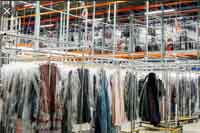| |
|
| |
|
 |
Supply
Chain by the Numbers |
| |
|
| |
- Oct. 10, 2019 -
|
| |
|
| |
|
| |
|
| |
US Loses Top Spot in Competitiveness; UPS Investing Big in Nat Gas Trucks; Rent the Runways Supply Chain Disaster; Study Says Shoppers will Avoid Fast Shipping to Reduce CO2 - Really? |
| |
|
| |
| |
| |
| |
2 |
|
That's where the US ranks in terms of having a globally competitive economy, overtaken this year from its usual spot on top by the island nation of Singapore. That according to the just released Global Competitiveness Report from the World Economic Forum, which is now in its 40th year. Hong Kong, the Netherlands and Switzerland rounded out the top five places in the rankings. The report's index maps out the competitive landscape of 141 economies based on more than 100 indicators in a dozen categories. Those categories include national health, financial system, market size, business dynamism and capacity to innovate. The analysis claims the U.S. is losing ground in measures such as "healthy life expectancy" and preparedness for the future skills needed in the 21st century. However, the report did say the US remain "an innovation powerhouse" and the world's most competitive large economy, and despite the prospects of a future skills gap, the US still ranks highly for "ease of finding skilled employees" today.
|
|
|
| |
| |
|
|
|
That's now much UPS says it is going to spend to add 6,000 vehicles powered by compressed natural gas (CNG) as well as building supporting infrastructure beginning next year. The new fleet additions will include heavy-duty trucks, medium-duty package vans, and terminal tractors. UPS expects to have finished adding the equipment by 2022. It is the largest multiyear commitment UPS has made to date for alternative fuel vehicles – and likely will serve as a shot in the arm to the somewhat struggling natural gas truck sector. Interestingly, UPS also noted the move will allow it the flexibility to move more towards "Renewable Natural Gas." What's that you ask? As opposed to traditional gas, RNG is derived from organic waste material found in daily life such as food waste, garden and lawn clippings, and animal and plant-based material. UPS has agreed to purchase 230 million gallon-equivalents of RNG over the next seven years, making the company the largest consumer of RNG in the transportation industry. |
| |
| |
|
| |
| |
11 |
 |
That's how many days apparel rental company Rent the Runway went offline after customers last month said that outfits they ordered for special events didn't arrive on time or were canceled with no warning – though it's now back in business. The disruption began in mid-September after Rent the Runway's new sorting system for clothes went into effect at its New Jersey distribution center. In total, 14% of Rent the Runway's subscribers and 6% of customers who use the service for one-off events were affected. The company said implementation of new distribution software caused issues with its garment on hanger sortation system. All that caused the company's top supply chain executive to step down as angry customers flocked to the service's social media pages to complain about being left without their planned garments for weddings and galas. The company now has a rapidly growing subscription business, with most of its customers paying a monthly fee of $159 to rent items ranging from Kate Spade dresses to Oscar de la Renta earrings. The service has also starting renting out children's clothing and home decor.
|
| |
| |
| |
| |
| |
|
|
|
| |
 |
 |
| |
|
|
| |